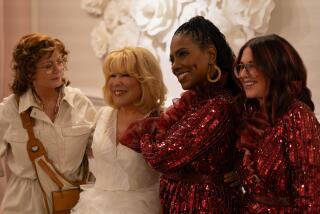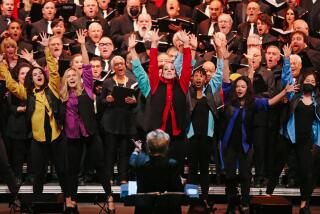Anonymous 4 delves deep into vintage Americana
- Share via
Gamely bucking the trend for classical singers to “go pop” by way of Broadway repertoire, the luminous vocal group Anonymous 4 has followed a different and meaningful extra-classical path of late. On the magnificent album “Gloryland,” a follow-up to the buzz-generating “American Angels” of 2004, the group takes up the specialized world of 19th century Americana. “Crossover” may be a de facto genre and marketing tag for its vintage American music. “Deep diving” is another suitable description.
Sunday at Royce Hall, the group presented an engagingly Sunday-go-to-meetin’ incarnation of the music. All was not vintage here. The singers came onstage in simple, homey garb, but sometimes their sartorial flair was contrasted by solid color backdrops, suggesting a Robert Wilson-esque starkness of vision.
Anon 4 is Marsha Genensky, Susan Hellauer, Jacqueline Horner and Johanna Maria Rose. They have dubbed their concert program “Long Time Traveling,” relating to the group’s long-standing commitment to musical time-traveling, with scholarship in tow. But instead of their more typical medieval musical turf, they have turned their attentions to shape-note pieces and early American gospel songs, camp song and other folky Southern comforts.
Thanks to their exacting blends and individual strengths as singers, the results are riveting and in some way present an illuminating trip into a dimly lighted corner of the American music experience. Songs like “The Lost Girl,” the haunting shape-note gem “Ecstasy” and the veritable theme song “Angel Band” came alive with a magnetic rusticity. Somehow, the women approach this material with the right grit and spices while preserving their studied musical sheen and never sounding prissy or fussy.
Working a cappella comes naturally to this group, and there were plenty of purely vocal moments along the way. But they were also effectively flanked by instrumentalists Darol Anger, on fiddle and mandolin, and Scott Nygaard on guitar. Both are fine and history-minded musicians, with an instinctive feeling for when to shine and when to humbly enhance the vocalists.
For an encore, the group broke with modern practice by repeating an earlier piece, “Green Pastures,” while trying to coax a reluctant (or lyric-challenged) Royce Hall crowd into singing along. The song choice was in the old-time religion tradition of the “reprise,” heeding the spirit’s moving. There was plenty of that this night.
More to Read
The biggest entertainment stories
Get our big stories about Hollywood, film, television, music, arts, culture and more right in your inbox as soon as they publish.
You may occasionally receive promotional content from the Los Angeles Times.










